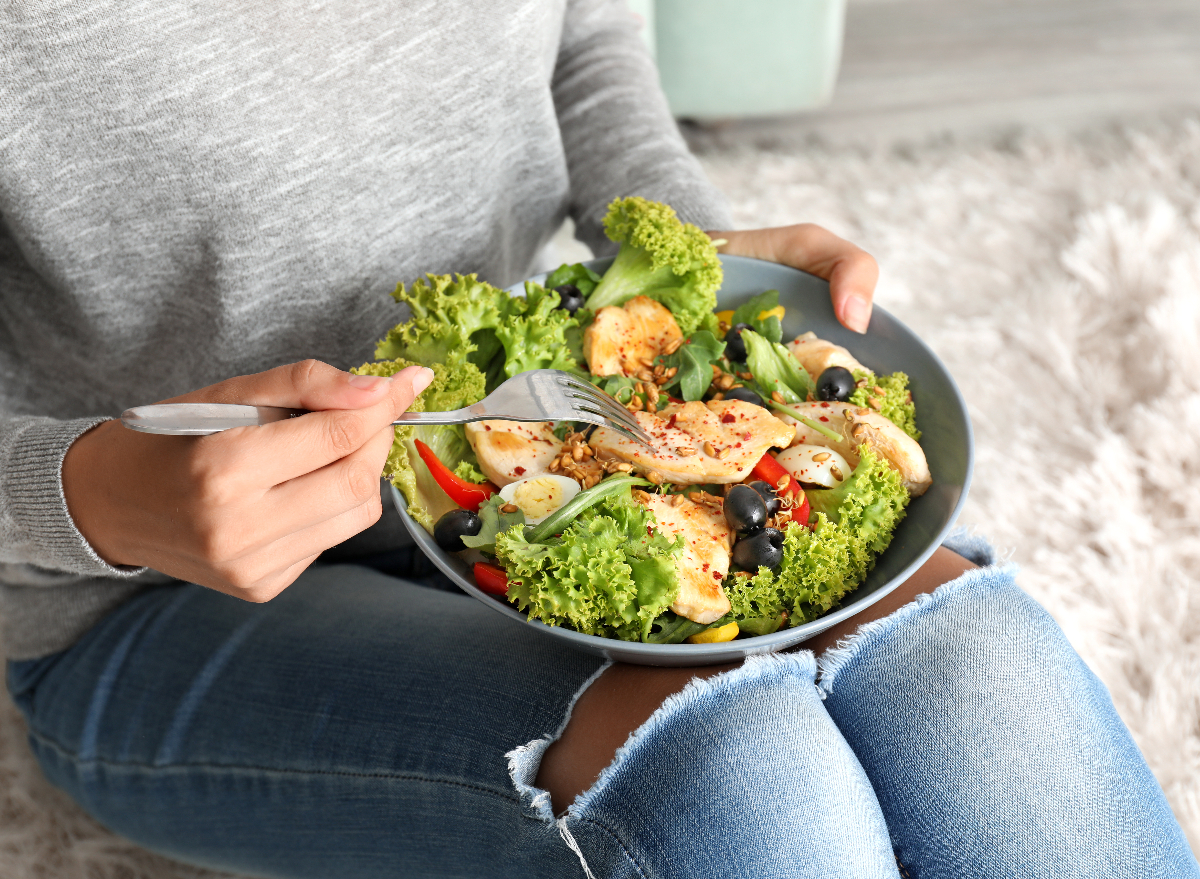
It's no secret that protein is an essential nutrient. One of the three primary macronutrients your body needs (along with carbohydrates and fats) is protein, which helps improve immune function, build and maintain muscle mass, keep you satiated, and support healthy weight management. But in the neverending quest for a protein-rich diet, knowing which foods are high in protein and low in calories is crucial in keeping your energy intake in check. That's why we chatted with registered dietitians who share the best high-protein, low-calorie foods to help keep you on track with your weight loss goals.
Whether you're on a weight loss journey, chasing muscle gains in the gym, or simply seeking a healthier lifestyle, understanding the nutritional content of your daily meals is paramount for reaching your health and fitness goals. We've compiled a comprehensive list of healthful, protein-dense foods that includes lean meats, plant-based options, snacks, and other meal staples to provide you with a wide range of foods that pack a protein punch while delivering fewer calories to add to your weight loss menu.
Read on to discover the best high-protein, low-calorie foods from registered dietitians. Then, when you're done, check out the 10 Best Breakfast Foods for Losing Weight & Gaining Muscle.
Chicken Breast
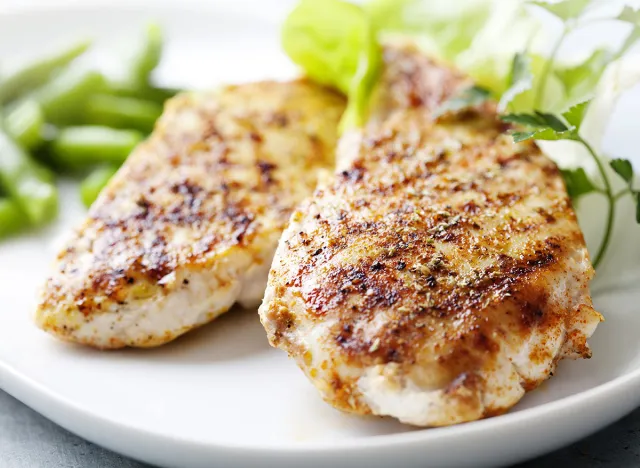
Serving size: 4 ounces (112 grams)
Calories: 120
Protein: 26 grams
Packed with lean protein, "Chicken breast is one of the best high-protein, low-calorie foods," says Kelsey Kunik, RDN, a registered dietitian at Graciously Nourished. Whether grilled, baked, or sautéed, chicken breast provides a protein-rich foundation for meals without adding a ton of calories.
Non-fat Greek Yogurt
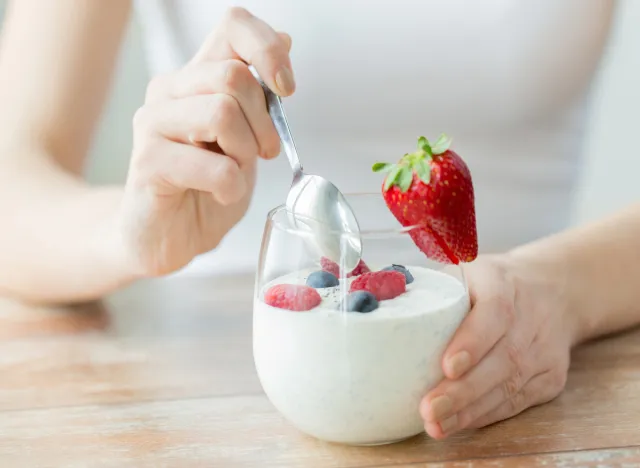
Serving size: 100 grams
Calories: 60
Protein: 10 grams
This rich and creamy breakfast option pairs well with fruits and granola or on its own. Sarah Schlichter, MPH, RDN, a registered dietitian at Bucket List Tummy, tells Eat This, Not That!, "Low-fat Greek yogurt offers the same amount of protein as high fat, with less fat. Greek yogurt has much more protein than traditional yogurt and boasts helpful gut-friendly probiotics. Use it as a smoothie base, or add to yogurt bowls, oatmeal, dips, and more."
Tuna
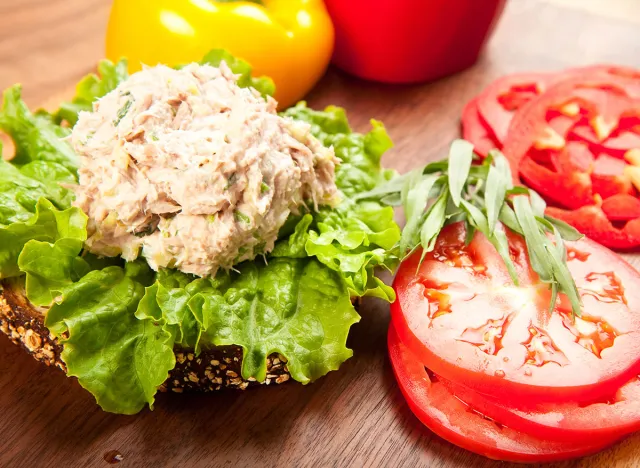
Serving size: 3 ounces (85 grams)
Calories: 122
Protein: 20 grams
Whether canned or fresh, tuna is a high-protein and versatile seafood that goes well in salads and sandwiches, making it an ideal choice for those seeking nutrient-dense options. "Canned tuna is a budget-friendly high-protein choice that's also low in calories," says Kunik. "It's an easy and convenient way to get protein and omega-3 fatty acids in your diet."
Edamame
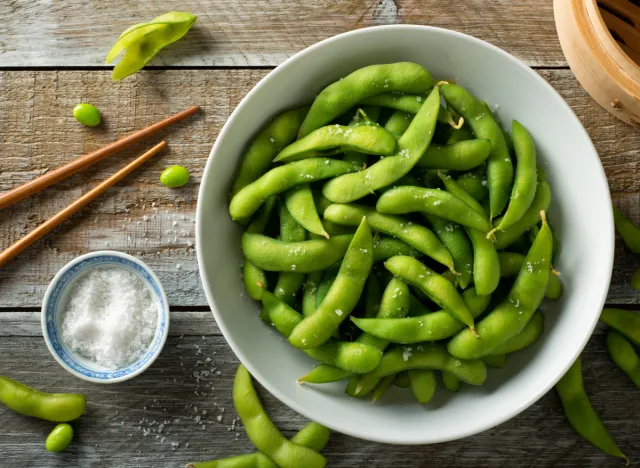
Serving size: 100 grams
Calories: 140
Protein: 12 grams
This plant-based option is low in calories and a fantastic source of essential nutrients like vitamin K, antioxidants, and fiber. Use edamame beans as a protein source in a bowl or salad, or just enjoy them as a snack. "Keep a bag of shelled edamame in your freezer to toss into pasta, salads, or stir-fries," recommends Kunik.
Low-Fat Cottage Cheese
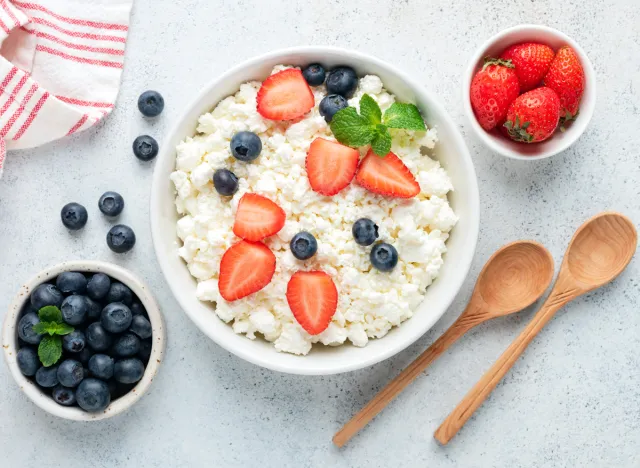
Serving size: 100 grams
Calories: 82
Protein: 11 grams
An underrated protein source, low-fat cottage cheese makes for a delicious standalone snack or a versatile ingredient in various dishes. "There's a reason cottage cheese is being added to everything these days. It's low in calories, high in protein, and is the perfect dip, smoothie addition, or side to a savory dinner," explains Kunik.
Lentils
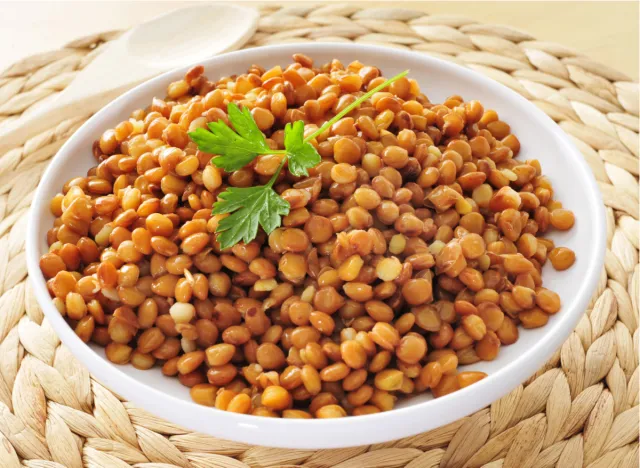
Serving size: 1 serving (35 grams)
Calories: 80
Protein: 10 grams
Besides being a plant-based protein source, lentils are a rich dietary fiber source supporting digestive health. Schlichter says, "Lentils pack a protein and fiber punch, which are great for satiety and weight management. A cup of lentils offers nearly 20 grams of protein, 15 grams of fiber, and several micronutrients."
Shrimp
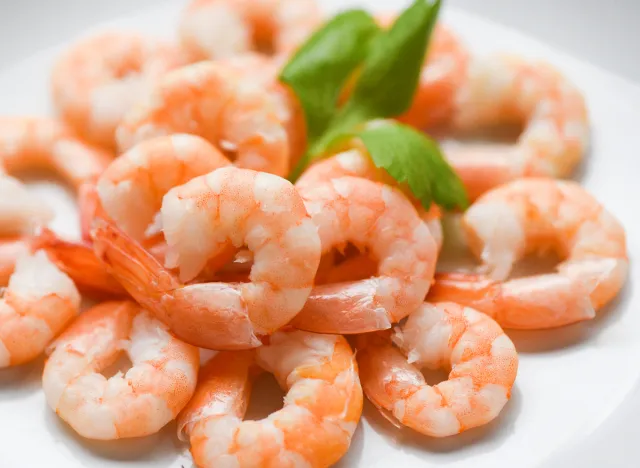
Serving size: 100 grams
Calories: 91
Protein: 17 grams
Shrimp not only delivers a lean source of protein but also boasts astaxanthin, a potent antioxidant that offers anti-inflammatory benefits. Additionally, shrimp contains selenium, which the National Institutes of Health says supports your body's defense against oxidative stress, contributing to immune system health.
Quinoa
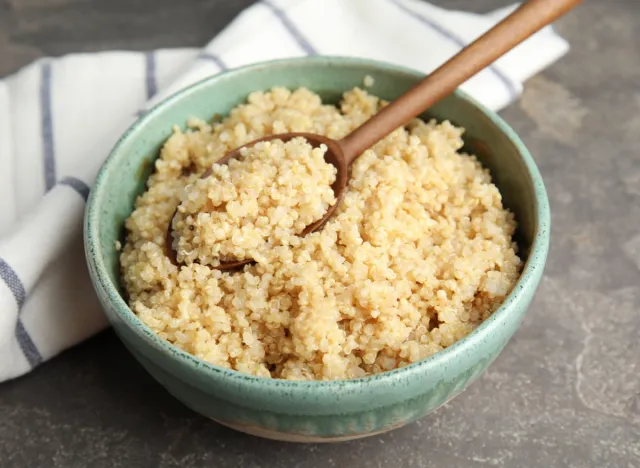
Serving size: 1 serving (44 grams)
Calories: 160
Protein: 5 grams
Quinoa is a complete plant protein source containing all nine essential amino acids. Also, it's gluten-free, high in magnesium, and an excellent source of iron.
Turkey Breast
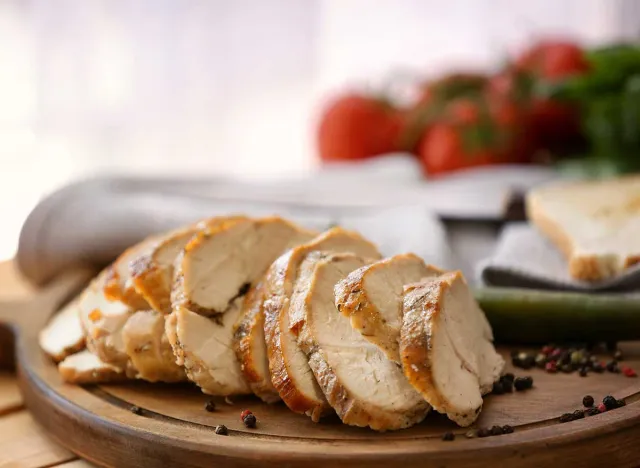
Serving size: 3 ounces (85 grams)
Calories: 125
Protein: 26 grams
Rich in lean protein, turkey breast also contains B vitamins, including niacin, which is crucial in energy metabolism. Turkey also contains selenium, which acts as an antioxidant, helping protect cells from damage.
Skinless Chicken Thighs
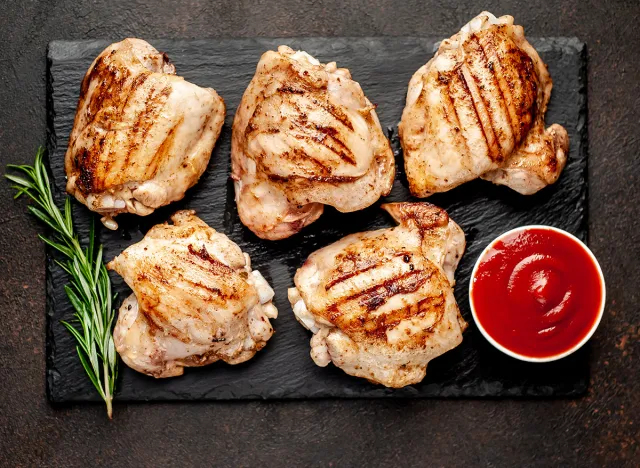
Serving size: 4 ounces (112 grams)
Calories: 140
Protein: 16 grams
Skinless chicken thighs are a protein-rich dark meat, which research shows contains more iron than white meat. Iron is an essential nutrient for energy production and red cell formation.
Egg Whites

Serving size: 100 grams
Calories: 52
Protein: 11 grams
Egg whites are a high-protein, low-calorie food, making them an excellent choice for those focusing on weight management. They're rich in branched-chain amino acids (BCAAs), which are crucial for muscle repair and growth.
Tempeh
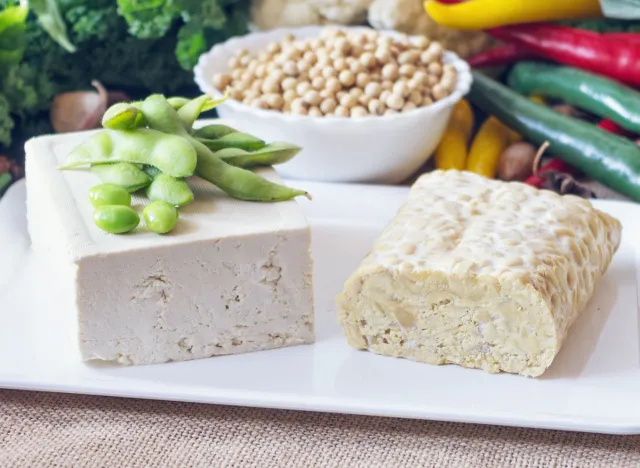
Serving size: 100 grams
Calories: 192
Protein: 20 grams
Tempeh, originating from fermented soybeans, is a plant-based protein powerhouse with a uniquely nutty flavor and firm texture. This soy-based protein source also contains paraprobiotics that may enhance the performance of athletes.
Tofu
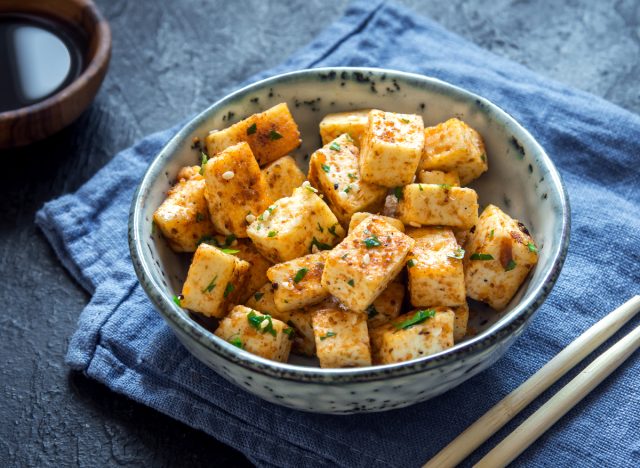
Serving size: 100 grams
Calories: 144
Protein: 17 grams
"Soy products, such as tofu, are great for providing protein without cholesterol and nutrients such as fiber, calcium, iron, and more," says Schlichter. Tofu is rich in essential amino acids, making it a complete protein source for vegetarians and vegans. Also, its neutral taste allows it to absorb the flavors of other ingredients, making it a go-to ingredient for both savory and sweet dishes.
Cod

Serving size: 3 ounces (85 grams)
Calories: 70
Protein: 15 grams
Cod is a nutrient-dense fish that not only supplies protein but also offers phosphorus, vital for bone health, and vitamin B12, crucial for nerve function and the formation of red blood cells.
Salmon
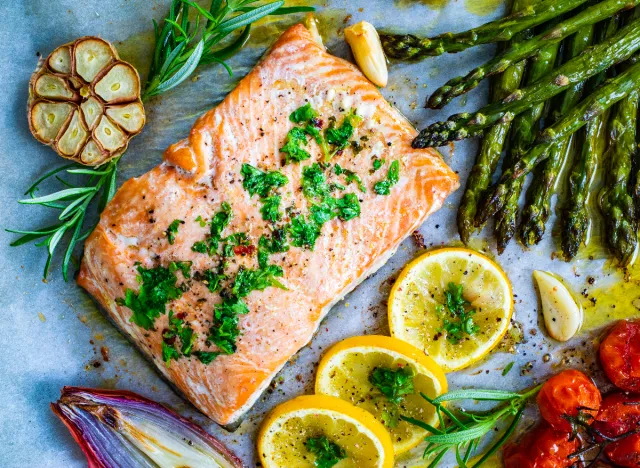
Serving size: 3 ounces (85 grams)
Calories: 177
Protein: 17 grams
Packed with protein and omega-3 fatty acids, this fatty fish promotes heart health, reduces inflammation, and supports brain function. Salmon is also rich in vitamin D, selenium, and B vitamins, boosting your overall nutrient intake.
Beans
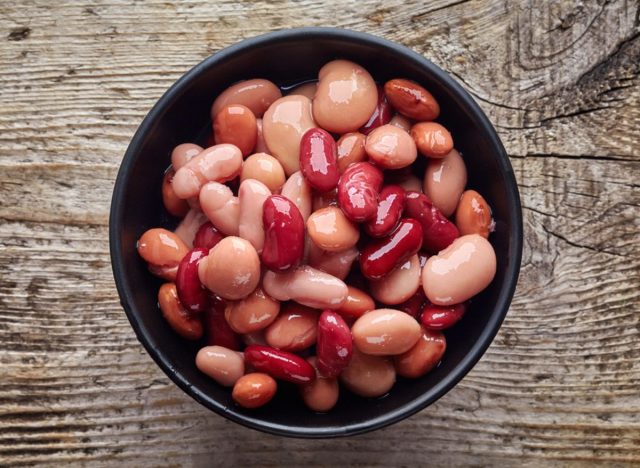
Serving size: 100 grams
Calories: 347
Protein: 21 grams
Beans are a fantastic addition to salads, sandwiches, stir-fries, and more, adding texture and nutrition to your meals. Rich in potassium for heart health, magnesium for muscle function, and iron for energy production, beans are truly a plant-based protein powerhouse.
"Beans, canned and dry, are a great, plant-based high protein option to add to salads, sandwiches, stir-fries, and more," says Schlichter. "Beans are also a great source of potassium, which is great for heart health, magnesium, iron, and more."
Eggs

Serving size: 1 extra-large egg
Calories: 80
Protein: 7 grams
Loaded with essential amino acids, vitamins, and minerals, multiple studies have found that eggs support muscle repair, boost metabolism, and keep you feeling full longer. Their yolks contain healthy fats and essential nutrients like choline, which are crucial for brain health.
"Eggs contain several important micronutrients, such as B vitamins, iron, choline, and more," Schlichter explains. "Pairing a few eggs and veggies with half of an English muffin or piece of toast is a healthy, low-calorie breakfast."
Jerky
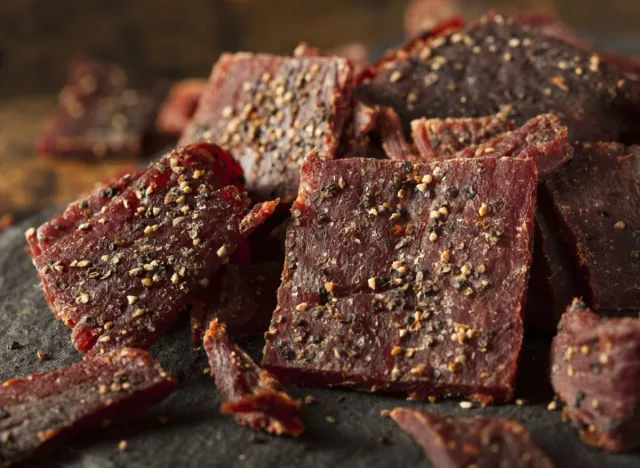
Serving size: 1 serving (28 grams)
Calories: 80
Protein: 10 grams
Typically made from lean meats like beef or turkey, jerky is a low-calorie and convenient option. "Jerky is a shelf-stable, on-the-go protein option, which is great for a snack or addition to lunch. Jerky is also a lean protein source of micronutrients, like iron and zinc," says Schlichter. However, be mindful of sodium content and select varieties with minimal additives.
Cauliflower
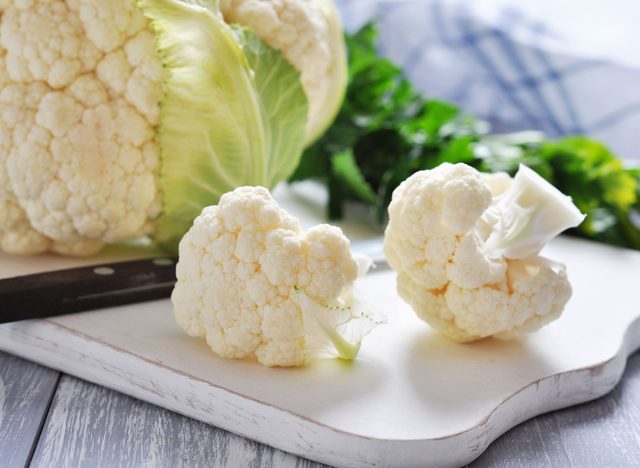
Serving size: 100 grams
Calories: 25
Protein: 2 grams
While not traditionally known for its protein content, cauliflower is a surprising addition to the high-protein, low-calorie foods category. This cruciferous vegetable provides a modest amount of protein along with a host of other nutrients. Also, cauliflower's versatility allows it to be roasted, mashed, or turned into a low-calorie pizza crust, offering a unique way to increase your protein intake while keeping calories in check.
Mushrooms
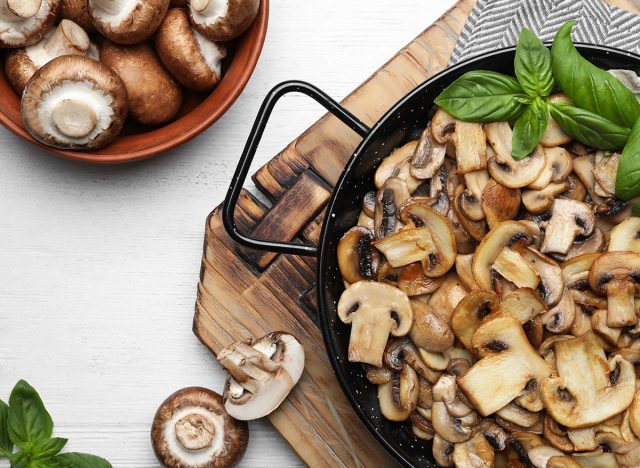
Serving size: 100 grams
Calories: 22
Protein: 3 grams
These fantastic fungi are an underrated protein source that offers a unique texture and flavor to dishes. Whether sautéed as a side, added to omelets, or used as a meat substitute in certain recipes, mushrooms add a modest amount of protein and essential vitamins and minerals, all while keeping your calorie intake in check.
- Source: Ha DJ, Kim J, Kim S, Go GW, Whang KY. Dietary Whey Protein Supplementation Increases Immunoglobulin G Production by Affecting Helper T Cell Populations after Antigen Exposure. Foods. 2021 Jan 19;10(1):194. doi: 10.3390/foods10010194. PMID: 33477967; PMCID: PMC7835905.
- Source: Lonnie M, Hooker E, Brunstrom JM, Corfe BM, Green MA, Watson AW, Williams EA, Stevenson EJ, Penson S, Johnstone AM. Protein for Life: Review of Optimal Protein Intake, Sustainable Dietary Sources and the Effect on Appetite in Ageing Adults. Nutrients. 2018 Mar 16;10(3):360. doi: 10.3390/nu10030360. PMID: 29547523; PMCID: PMC5872778.
- Source: Moon J, Koh G. Clinical Evidence and Mechanisms of High-Protein Diet-Induced Weight Loss. J Obes Metab Syndr. 2020 Sep 30;29(3):166-173. doi: 10.7570/jomes20028. PMID: 32699189; PMCID: PMC7539343.
- Source: Hansen TT, Astrup A, Sjödin A. Are Dietary Proteins the Key to Successful Body Weight Management? A Systematic Review and Meta-Analysis of Studies Assessing Body Weight Outcomes after Interventions with Increased Dietary Protein. Nutrients. 2021 Sep 14;13(9):3193. doi: 10.3390/nu13093193. PMID: 34579069; PMCID: PMC8468854.
- Source: Yaqoob Z, Arshad MS, Imran M, Munir H, Qaisrani TB, Khalid W, Asghar Z, Suleria HAR. Mechanistic role of astaxanthin derived from shrimp against certain metabolic disorders. Food Sci Nutr. 2021 Nov 30;10(1):12-20. doi: 10.1002/fsn3.2623. PMID: 35035906; PMCID: PMC8751436.
- Source: Office of Dietary Supplements - selenium. (n.d.). https://ods.od.nih.gov/factsheets/Selenium-HealthProfessional/
- Source: Angeli V, Miguel Silva P, Crispim Massuela D, Khan MW, Hamar A, Khajehei F, Graeff-Hönninger S, Piatti C. Quinoa (Chenopodium quinoa Willd.): An Overview of the Potentials of the "Golden Grain" and Socio-Economic and Environmental Aspects of Its Cultivation and Marketization. Foods. 2020 Feb 19;9(2):216. doi: 10.3390/foods9020216. PMID: 32092899; PMCID: PMC7074363.
- Source: Office of Dietary Supplements - Niacin. (n.d.). https://ods.od.nih.gov/factsheets/Niacin-HealthProfessional/
- Source: Giromini C, Givens DI. Benefits and Risks Associated with Meat Consumption during Key Life Processes and in Relation to the Risk of Chronic Diseases. Foods. 2022 Jul 12;11(14):2063. doi: 10.3390/foods11142063. PMID: 35885304; PMCID: PMC9318327.
- Source: Matsuoka R, Sugano M. Health Functions of Egg Protein. Foods. 2022 Aug 2;11(15):2309. doi: 10.3390/foods11152309. PMID: 35954074; PMCID: PMC9368041.
- Source: Subali D, Christos RE, Givianty VT, Ranti AV, Kartawidjajaputra F, Antono L, Dijaya R, Taslim NA, Rizzo G, Nurkolis F. Soy-Based Tempeh Rich in Paraprobiotics Properties as Functional Sports Food: More Than a Protein Source. Nutrients. 2023 Jun 1;15(11):2599. doi: 10.3390/nu15112599. PMID: 37299562; PMCID: PMC10255641.
- Source: Office of Dietary Supplements - Phosphorus. (n.d.). https://ods.od.nih.gov/factsheets/Phosphorus-HealthProfessional/
- Source: Office of Dietary Supplements - Vitamin B12. (n.d.). https://ods.od.nih.gov/factsheets/VitaminB12-HealthProfessional/
- Source: Office of Dietary Supplements - Omega-3 fatty acids. (n.d.). https://ods.od.nih.gov/factsheets/Omega3FattyAcids-HealthProfessional/
- Source: Office of Dietary Supplements - Potassium. (n.d.). https://ods.od.nih.gov/factsheets/Potassium-HealthProfessional/
- Source: Office of Dietary Supplements - magnesium. (n.d.). https://ods.od.nih.gov/factsheets/Magnesium-Consumer/
- Source: Office of Dietary Supplements - Iron. (n.d.). https://ods.od.nih.gov/factsheets/Iron-HealthProfessional/
- Source: Mullins AP, Arjmandi BH. Health Benefits of Plant-Based Nutrition: Focus on Beans in Cardiometabolic Diseases. Nutrients. 2021 Feb 5;13(2):519. doi: 10.3390/nu13020519. PMID: 33562498; PMCID: PMC7915747.
- Source: Myers M, Ruxton CHS. Eggs: Healthy or Risky? A Review of Evidence from High Quality Studies on Hen's Eggs. Nutrients. 2023 Jun 7;15(12):2657. doi: 10.3390/nu15122657. PMID: 37375561; PMCID: PMC10304460.
- Source: Office of Dietary Supplements - Choline. (n.d.). https://ods.od.nih.gov/factsheets/Choline-Consumer/









